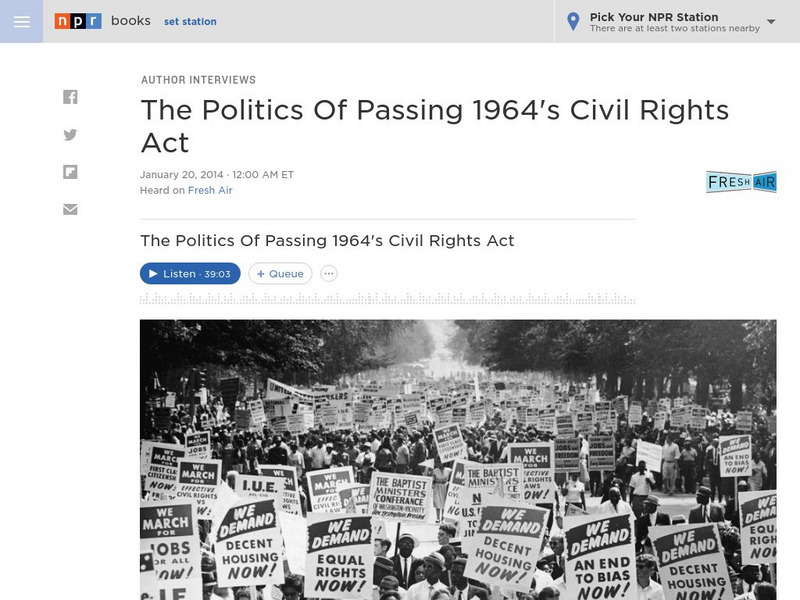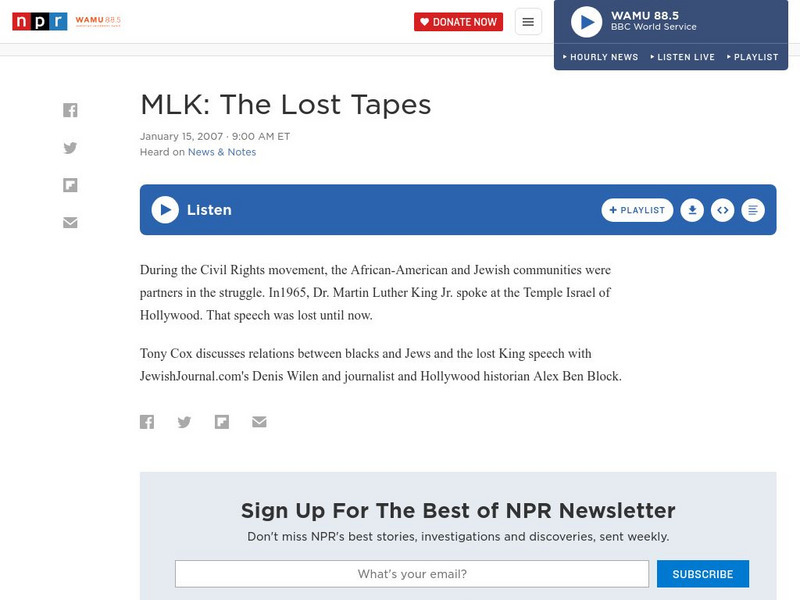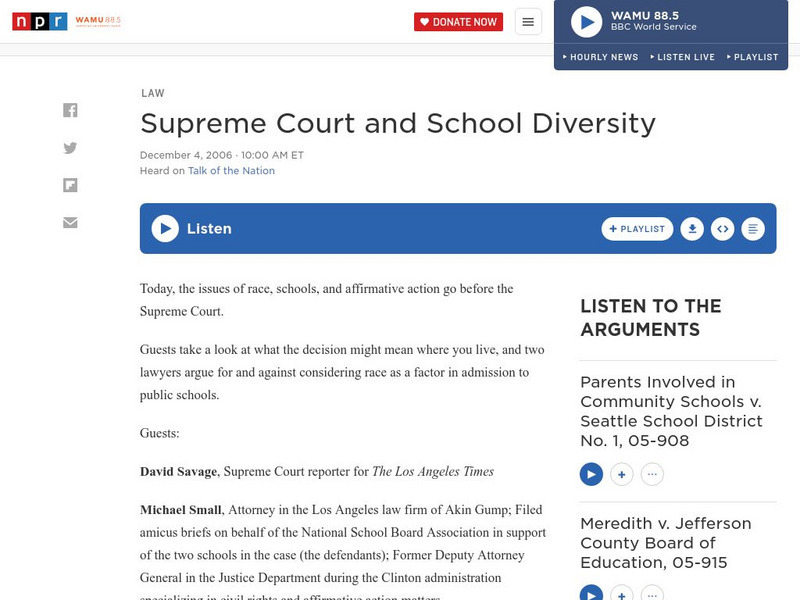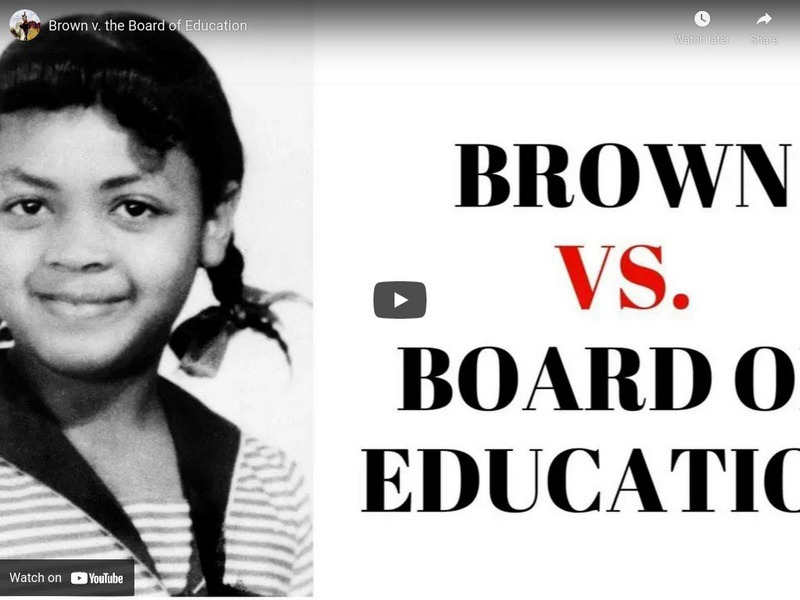NPR: National Public Radio
Npr: Fresh Air: The Politics of Passing 1964's Civil Rights Act
Listen to or read the transcript of the interview Terry Gross of NPR had with the author of An Idea Whose Time Has Come: Two Presidents, Two Parties and the Battle for the Civil Rights Act of 1964, a book describing the background and...
National Endowment for the Humanities
Neh: Created Equal: Freedom Riders
A documentary film that tells the story of the Freedom Riders who in1961 protested segregation by riding interstate buses into the Deep South of the United States. There they faced racial violence and hatred with no protection from law...
Curated OER
History Matters: "Cast Down Your Bucket Where You Are"
Booker T. Washington gave an influential speech in Atlanta in September, 1895. In 1903 he recorded a portion of the speech, which is available on this site, the only extant recording of his voice.
PBS
Pbs: American Experience: Sleepy Lagoon Case
The disturbing story of the Sleepy Lagoon case in which 22 Mexican American defendants were tried together in the same court case in front of Charles W. Fricke (1882-1958 CE).
Center For Civic Education
60 Second Civics: Civil Rights Part 2: De Jure Segregation
On today's podcast, we define de jure segregation. This is a rebroadcast of a show that originally aired on November 4, 2011.
Center For Civic Education
60 Second Civics: Civil Rights Part 3: De Facto Segregation
Today we define de facto segregation. This is a rebroadcast of an episode that originally aired in November, 2011.
Center For Civic Education
60 Second Civics: Civil Rights Part 8: Resisting Jim Crow
On today's episode, we discuss Jim Crow laws and the ways African Americans organized to resist them.
Center For Civic Education
60 Second Civics: Jim Crow
Jim Crow laws were adopted by most Southern states after the end of Reconstruction.
Center For Civic Education
60 Second Civics: Plessy v. Ferguson
The Supreme Court decision in the case of Plessy v. Ferguson (1896) permitted racial segregation so long as facilities were separate but equal. This type of segregation endured for nearly sixty years.
Center For Civic Education
60 Second Civics: Brown v. Board of Education
In the Brown v. Board of Education case, a father fought the issue of racial segregation in the schools. He lost and the case was appealed to the Supreme Court.
Center For Civic Education
60 Second Civics: Brown v. Board of Education Part 2
The Supreme Court decision in the case of Brown v Board of Education (1954) ended school segregation but was difficult to enforce.
Center For Civic Education
60 Second Civics: Episode 224: Civil Rights Movement Part 3
Today we discuss two types of segregation that contributed to racial polarization in the United States.
Sophia Learning
Sophia: Inequalities in Patterns of Interaction: Lesson 2
This lesson will define miscegenation, pluralism, assimilation, segregation, genocide, and apartheid. It is 2 of 4 in the series titled "Inequalities in Patterns of Interaction."
NPR: National Public Radio
Npr: Mlk: The Lost Tapes
The African-American and Jewish communities struggled together during the Civil Rights movement. Here is an in-depth look at Martin Luther King, Jr.'s speech at the Temple Israel of Hollywood, which provides clips of the speech and...
NPR: National Public Radio
Npr: Supreme Court and School Diversity
The emotionally-charged issues of race, affirmative action, school diversity, and segregation are explored in response to a Supreme Court case involving K-12 schools. Listen to arguments for and against "racial quotas" in public schools.
Other
Reading Through History: Brown v. the Board of Education
This video gives a brief description of the landmark Supreme Court case Brown v. the Board of Education. [4:16]
Khan Academy
Khan Academy: Us History: 1865 1898: Fourteenth and Fifteenth Amendments
During Reconstruction, federal troops attempted to enforce the Fourteenth and Fifteenth Amendments in the South. [4:00]
Khan Academy
Khan Academy: Residential Segregation
This video lesson discusses residential segregation, one type of social inequality. This video lesson was developed in collaboration with the Association of American Medical Colleges and Khan Academy.
iCivics
I Civics: The Naacp Legal Defense Fund
While people protest in the streets, the Legal Defense Fund fights for them in the courts, challenging discriminatory laws in every aspect of life. [1:56]
Have Fun With History
Have Fun With History: Integration Report 1
Integration Report 1 is a civil rights documentary covering the year between 1959 and 1960 in Montgomery, Alabama, in Brooklyn, New York, and in Washington, D.C..
Center For Civic Education
60 Second Civics: Naacp
The National Association for the Advancement of Colored People has played a critical role in improving the lives of African Americans in its battle against all types of racial discrimination.
Center For Civic Education
60 Second Civics: Rights Before Civil War Pt. 12: The Ideal of Equality
The ideal of equality was stated in the Declaration of Independence. Abolitionists and African Americans used this as an argument against segregation.
Center For Civic Education
60 Second Civics: Civil Rights Part 6: Segregation in the 1950s
On today's episode we examine segregation in the 1950s. This episode originally aired in November 2011.
Crash Course
Crash Course Sociology #35: Racial/ethnic Prejudice and Discrimination
We can't talk about race without also discussing racism, so today we are going to define and explain prejudice, stereotypes, and racism. We'll look at five theories for why prejudice exists. We'll discuss discrimination and the legacies...












